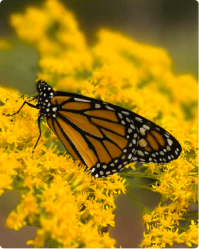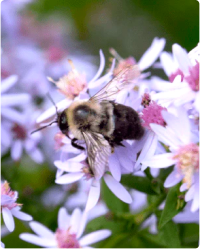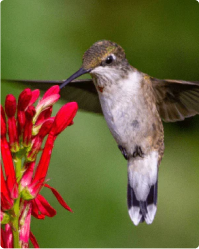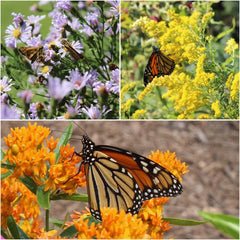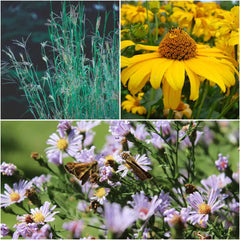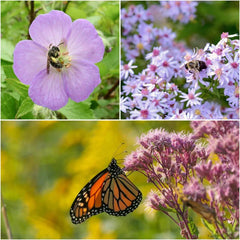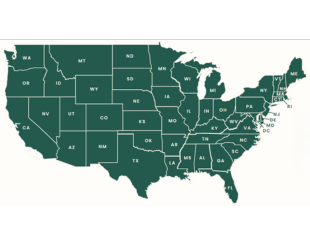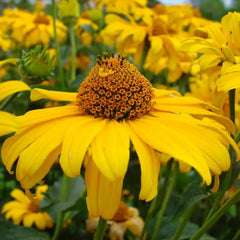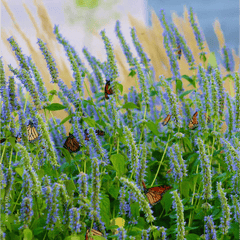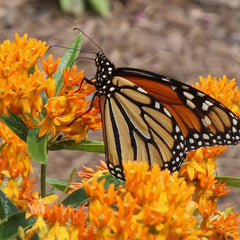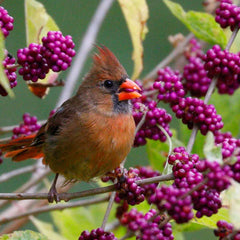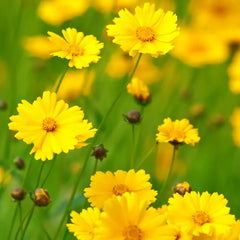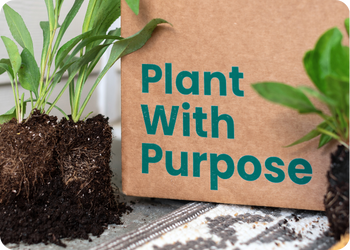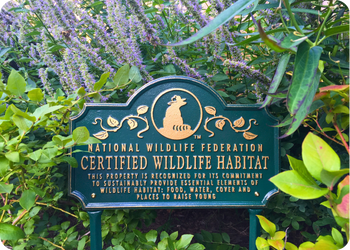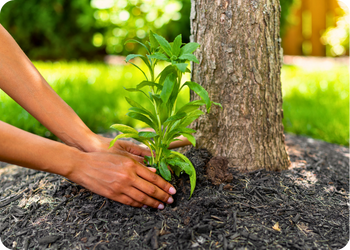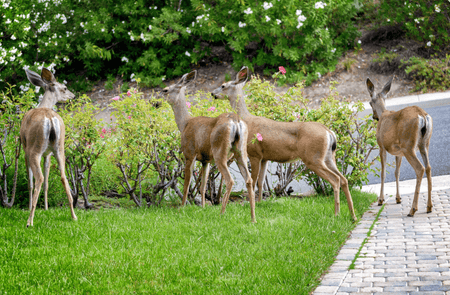Native Plants For Every Stage of a Butterfly's Life Cycle

Native Plants For Butterflies
Butterflies, with their delicate wings and vibrant colors, are not just a sight to behold but also play a crucial role in our ecosystem. Their life cycle, from egg to caterpillar to chrysalis and finally to a graceful adult, is a mesmerizing journey. What many may not realize is that native plants play a pivotal role in supporting each stage of this cycle. In this blog post, we'll delve into the fascinating relationship between butterflies and native plants, exploring how these plants serve as nurturing havens for these winged wonders.

The Butterfly Life Cycle Stages
Before we dive into the world of native plants, let's briefly outline the four stages of a butterfly's life cycle: egg, larva (caterpillar), pupa (chrysalis), and adult. Each stage has its unique requirements, and native plants cater to these needs in ways that non-native species often cannot.
Egg Stage
Butterflies carefully select host plants to lay their eggs, as these plants provide essential nutrients for the developing larvae. Native plants have evolved alongside local butterfly species, developing a symbiotic relationship. The chemical cues emitted by native plants signal to butterflies that this environment is suitable for their offspring. For example, the Monarch butterfly seeks out native milkweed plants to lay its eggs. The egg stage is a critical juncture, and native plants act as the foundation for a successful beginning.
Larva (Caterpillar) Stage
Once the eggs hatch, caterpillars emerge and start feeding on the host plants. Native plants offer a nutritious and balanced diet for caterpillars, aiding in their rapid growth. The coevolution between native plants and butterflies ensures that the leaves and foliage are adapted to the specific needs of the caterpillar. This mutually beneficial relationship is a testament to the interconnectedness of the natural world.
Pupa (Chrysalis) Stage
As caterpillars reach maturity, they undergo metamorphosis, forming chrysalides. Native plants continue to play a vital role during this stage, providing shelter and support for the pupa. The strategic placement of chrysalides on or near native plants is a survival tactic, ensuring that the emerging butterfly has immediate access to its preferred nectar sources.
Adult Stage
The final stage of the butterfly life cycle sees the emergence of the adult butterfly. Native plants come full circle by offering nectar-rich flowers, serving as essential food sources for adult butterflies. The unique shapes and structures of native flowers often align with the specialized mouthparts of butterflies, facilitating effective pollination.
Benefits of Native Plants for Butterflies
Biodiversity Conservation: Native plants support a diverse range of butterfly species, each adapted to specific plant characteristics. This diversity is crucial for the overall health and resilience of ecosystems.
Adaptation to Local Conditions: Native plants are well-suited to local climate, soil, and environmental conditions. This adaptability enhances their resilience and ensures a stable habitat for butterflies throughout their life cycle.
Pollination Partnership: Butterflies play a vital role in pollination, and native plants reciprocate by offering nectar as a food source. This mutualistic relationship is a cornerstone of healthy ecosystems.
5 Native Butterflies You Might See In Your Garden for Wildlife
Creating a native plant garden not only serves as a sanctuary for butterflies but also provides an opportunity to witness the beauty of various native species. Let's explore five common native butterflies that might visit your carefully curated garden for wildlife.
Monarch Butterfly (Danaus plexippus)
Description: The Monarch butterfly is arguably one of the most iconic and recognizable species, known for its vibrant orange wings adorned with black veins and white spots. Monarchs undertake incredible migrations, traveling thousands of miles between North America and Mexico.
Habitat and Plants: Monarchs rely heavily on milkweed plants as their exclusive host for egg-laying. Orange butterfly milkweed (asclepias tuberosa), common milkweed (Asclepias syriaca) and swamp milkweed (Asclepias incarnata) are particularly favored, providing essential nutrients for both caterpillars and adults.
Eastern Tiger Swallowtail (Papilio glaucus)
Description: This large and striking butterfly features yellow wings with black stripes and blue or black markings near the edges. Female Eastern Tiger Swallowtails can exhibit two different color forms: yellow and black or black and blue.
Habitat and Plants: Look for Eastern Tiger Swallowtails sipping nectar from a variety of flowers, including native favorites like Joe-Pye Weed, Coneflower, and Black-eyed Susan.
Painted Lady (Vanessa cardui)
Description: The Painted Lady is a widespread butterfly known for its intricate and delicate wing patterns. Its wings boast a combination of orange, black, and white, creating a masterpiece of nature's artistry.
Habitat and Plants: Painted Ladies are highly adaptable and can be found in various habitats. They are attracted to a range of nectar-rich flowers, including native plants like Liatris, Verbena, and Butterfly Weed (Asclepias tuberosa).
Red Admiral (Vanessa atalanta)
Description: Recognizable by its distinctive black wings adorned with red-orange bands, the Red Admiral is a versatile butterfly often found in gardens, woodlands, and urban areas.
Habitat and Plants: Red Admirals are known to frequent native plants such as Purple Coneflower, Common Milkweed, and Sweet Joe-Pye Weed for nectar and as potential host plants.
Eastern Black Swallowtail (Papilio polyxenes)
Description: This elegant butterfly boasts black wings with iridescent blue markings, creating a striking contrast. The caterpillars are equally captivating, with vibrant green bodies adorned with black and yellow markings.
Habitat and Plants: The Eastern Black Swallowtail seeks out native plants like Parsley, Dill, and Fennel as host plants for its larvae. Adults are attracted to a variety of nectar-rich flowers, including native favorites like Bee Balm and Phlox.
Choosing Native Plants for Butterfly Gardens
Creating a butterfly-friendly garden involves careful selection of native plants that cater to the needs of each life stage. Here are some popular native plants known for their attractiveness to butterflies:
Milkweed (Asclepias spp.)
Essential for Monarch butterflies, milkweed serves as the primary host plant for their larvae. The nectar-rich flowers also attract adult butterflies.
Black-eyed Susan (Rudbeckia hirta) This vibrant perennial is a favorite among many butterfly species, providing nectar for adults and a suitable habitat for caterpillars.
This vibrant perennial is a favorite among many butterfly species, providing nectar for adults and a suitable habitat for caterpillars.
Joe-Pye Weed (Eutrochium purpureum)
A tall, native wildflower, Joe-Pye Weed attracts a variety of butterflies with its clusters of pink or purple flowers.
Goldenrod (Solidago spp.):
Often unfairly blamed for allergies, goldenrod is a valuable late-season nectar source for butterflies, supporting them as they prepare for migration or hibernation.
Grayleaf Goldenrod
Sweet Goldenrod
Zig Zag Goldenrod
Coneflower (Echinacea spp.): Known for its distinctive cone-shaped center, coneflower is a magnet for butterflies, bees, and other pollinators.
Known for its distinctive cone-shaped center, coneflower is a magnet for butterflies, bees, and other pollinators.
Cautionary Considerations: The Pitfalls of Butterfly Bush and Tropical Milkweed
While the intention behind planting butterfly-friendly gardens is noble, not all plants marketed as beneficial for butterflies are created equal. Two commonly recommended species, Butterfly Bush (Buddleja davidii) and Tropical Milkweed (Asclepias curassavica), have gained popularity but come with potential drawbacks that warrant careful consideration.
Butterfly Bush
 Often praised for its attractive blooms and the promise of attracting butterflies, the Butterfly Bush has faced criticism for its invasive tendencies. Native to Asia, this plant can outcompete and displace local vegetation, disrupting ecosystems and reducing biodiversity.
Often praised for its attractive blooms and the promise of attracting butterflies, the Butterfly Bush has faced criticism for its invasive tendencies. Native to Asia, this plant can outcompete and displace local vegetation, disrupting ecosystems and reducing biodiversity.
Invasiveness: Butterfly Bush can spread rapidly, particularly in areas with mild climates. Its prolific seed production and ability to establish in disturbed habitats raise concerns about its impact on native plant communities.
Limited Caterpillar Support: While the nectar-rich flowers may attract adult butterflies, Butterfly Bush does not provide suitable foliage for many caterpillar species. Successful butterfly gardens should prioritize plants that cater to all stages of the butterfly life cycle.
Alternative: Consider native alternatives like milkweed, Joe-Pye weed, black-eyed Susan, or coneflower that offer a more balanced and ecologically responsible choice for supporting butterflies.
Read: The Truth about Butterfly Bush (and what to plant instead!)
Tropical Milkweed (Asclepias curassavica)

Known for its vibrant orange and red flowers, tropical milkweed has gained popularity as a host plant for Monarch butterflies. However, its year-round availability in warmer climates can disrupt natural migration patterns and contribute to the spread of a deadly protozoan parasite, Ophryocystis elektroscirrha (OE).
Disruption of Migration: In regions with milder climates, Tropical Milkweed may not die back during the winter, providing a continuous breeding ground for Monarchs. This disrupts their natural migratory behavior and exposes them to diseases.
OE Parasite Concerns: The prolonged presence of Tropical Milkweed can lead to higher concentrations of the OE parasite, negatively impacting the health of Monarch populations.
Alternative: Opt for native milkweed species such as common milkweed (Asclepias syriaca) or swamp milkweed (Asclepias incarnata) that follow natural seasonal cycles and mitigate the risk of disease transmission.
In our commitment to supporting butterflies and preserving biodiversity, it is crucial to make informed choices about the plants we introduce to our landscapes. By avoiding species with invasive tendencies or those that may unintentionally harm butterfly populations, we can contribute to the creation of gardens that truly nurture and sustain these delicate creatures throughout their entire life cycle.
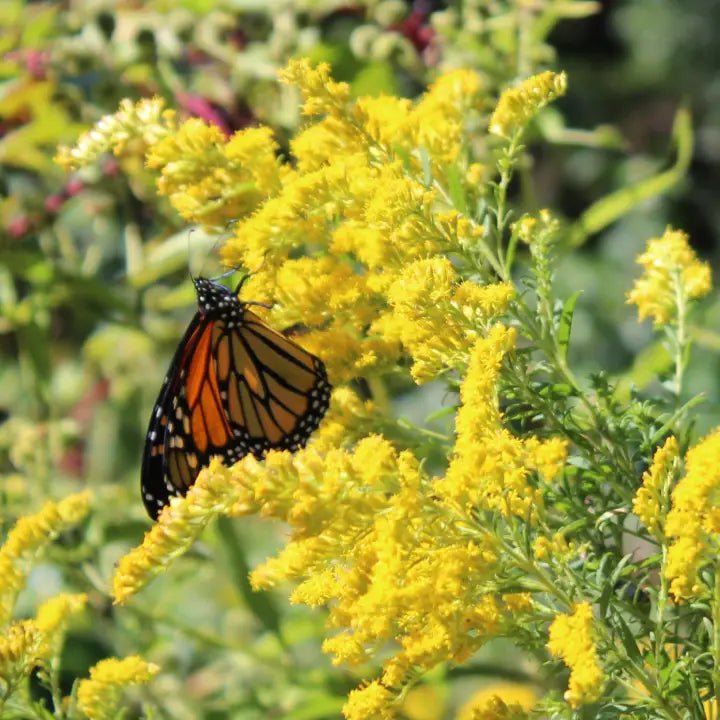
Find Native Plants by Zip Code
We took the guesswork out of planting native. Check your zip to see what ships!
